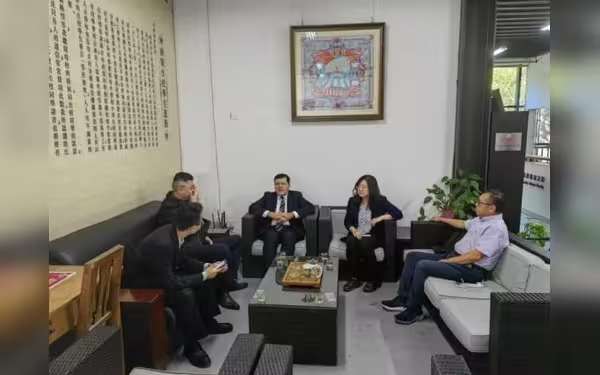Saturday, November 16, 2024 05:41 PM
UoS Vice Chancellor Strengthens Pakistan-China Academic Ties
- Agreements signed with Tianjin University for TCM program.
- China-Pak Technology Transfer Center established for innovation.
- Partnerships formed to enhance agricultural and technical education.
 Image Credits: urdupoint
Image Credits: urdupointUoS Vice Chancellor's visit to China enhances academic ties and establishes key partnerships for innovation and education.
The recent visit of the Vice Chancellor of the University of Sargodha, Prof. Dr. Qaisar Abbas, to China marks a pivotal moment in the strengthening of academic and technological ties between Pakistan and China. This visit, which concluded successfully, was aimed at enhancing collaboration in education, promoting joint research initiatives, and driving technological innovation. Such efforts are crucial as both nations seek to bolster their educational frameworks and technological advancements.
During his time in China, Prof. Dr. Qaisar Abbas signed significant agreements with the Tianjin University of Traditional Chinese Medicine (TCM). This partnership will introduce a TCM program under the Transnational Education (TNE) policy, allowing students from Pakistan to gain insights into traditional Chinese medicine. This initiative not only enriches the academic offerings at the University of Sargodha but also fosters a deeper understanding of alternative medical practices.
Moreover, the establishment of the China-Pak Technology Transfer Center is a noteworthy development. This center will focus on research, innovation, and technology transfer, particularly in the fields of Information Technology (IT) and engineering. Such a center is expected to facilitate the exchange of knowledge and resources, ultimately benefiting both countries.
Prof. Dr. Qaisar Abbas also engaged with academic leaders at Nankai University, where discussions revolved around potential joint research opportunities in various disciplines, including economics and pharmaceutical sciences. These discussions are vital as they pave the way for collaborative projects that can lead to groundbreaking discoveries and advancements.
In addition to these academic collaborations, the Vice Chancellor participated in the Annual World Agriculture Food Innovation Conference held in Beijing. His visit to the Agricultural Zhongguancun Science Park was particularly significant, as it resulted in signing an intent of cooperation to develop an agro-based company in Sargodha. This initiative aims to enhance local agricultural industries by leveraging Chinese technology and research, which could lead to improved agricultural practices and increased productivity.
Furthermore, the University of Sargodha formalized several partnerships with leading Chinese institutions through Memorandums of Understanding. These partnerships include collaboration with Tang International Education to promote technical education and a partnership with the Action Academy of the Beijing Film and Television Research Institute to strengthen cooperation in film and media studies. Such agreements are designed to enhance academic and cultural exchanges, enriching the educational landscape for students in both countries.
The visit of Prof. Dr. Qaisar Abbas to China is a significant step forward in fostering educational and technological cooperation between Pakistan and China. The agreements and partnerships established during this visit not only promise to enhance academic offerings but also aim to drive innovation and research in various fields. As these collaborations unfold, they hold the potential to create a brighter future for students and researchers alike, ultimately benefiting both nations in their quest for knowledge and progress.













